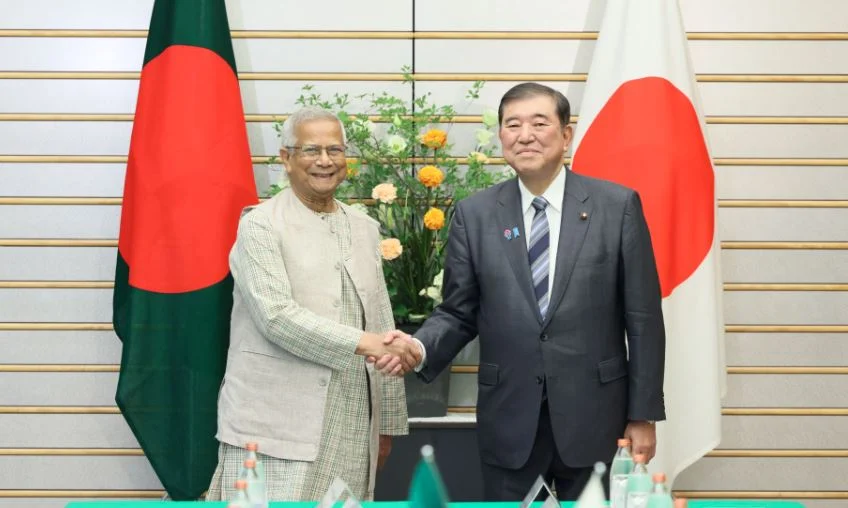
TOKYO, May 30, 2025 (BSS) - Bangladesh Chief Adviser Professor Muhammad Yunus and Japanese Prime Minister Shigeru Ishiba on Friday announced that the two nations will conclude an Economic Partnership Agreement in the coming months to deepen economic and trade relationships between the two friendly nations.
They made the commitment during an official bilateral meeting between two leaders at the office of the Japanese Prime Minister in Tokyo, according to a statement issued by the Chief Adviser's Press Wing.
Their talks encompassed the entire gamut of the relationships between the two friendly countries, with both leaders reaffirming their abiding commitment to strategic partnership.
Japanese Prime Minister Ishiba described Bangladesh as a long-standing friend and stated that Japan would stand by Bangladesh in its endeavour for a democratic transition.
Shigeru Ishiba also paid tribute to Prof Yunus, saying Bangladesh will usher in a new era under his leadership.
He also highlighted Bangladesh's importance for ensuring peace and stability in the Indo-Pacific region. "Bangladesh plays a critical role in regional stability," the Japanese Prime Minister said.
The Japanese Prime Minister said the two countries would conclude an Economic Partnership Agreement by the end of this year in an effort to boost trade and investment between the two nations.
The Bangladesh Chief Adviser thanked Prime Minister Ishiba for Japan's unwavering support of Bangladesh in the last ten months after the previous regime left a shattered economy, an empty coffer and destroyed institutions.
"We thank Japan for supporting the interim government and its reform initiatives. We seek Japan's active support and cooperation in our endeavour," he said.
Prof Yunus reiterated Bangladesh's firm commitment to a vision of a free, open and inclusive Indo-Pacific for the shared prosperity of all.
"Bangladesh is ready to forge partnership and cooperation with Japan to ensure maritime safety and security, freedom of navigation, sustainable use and management of marine resources, promote enhanced connectivity, and combat transnational organised crimes in the Indo-Pacific," the Chief Adviser said.
He noted significant progress in the EPA negotiations and high-level visits in this regard recently.
"In pursuing our bilateral relations, we look forward to sustained engagements with Japan," Prof Yunus said.
The Chief Adviser sought Japanese support for the construction of a land-based LNG terminal at Matarbari, an import-based LPG terminal at Moheshkhali and duty-free and quota-free access of Bangladeshi products to Japan for at least three years after the LDC graduation of Bangladesh in 2026.
He also sought a Japanese soft loan for the improvement of the Dhaka-Chattagram National Highway into a six-lane access-controlled expressway, the upgradation of the Chattagram-Cox's Bazar highway and the construction of a new four-lane bridge over the Meghna-Gomti river.
He requested the Japanese Prime Minister to encourage Japanese manufacturers to invest in automobiles and electric vehicles, light machinery, high-tech electronics and the solar industry in Bangladesh and to connect its industrial value chain with Japan.
He urged Tokyo to launch the Bangladesh-Japan Skilled Workforce Partnership programme in an effort to meet Japanese labour shortages and pave the way for the recruitment of hundreds of thousands of Bangladeshi workers in Japan.
The Chief Adviser also asked Japan to increase the number of scholarships for the Bangladeshi students and for technical and vocational education training instructors to study in Japan.
The Japanese Prime Minister said Tokyo would provide assistance to Bangladesh to help overcome its challenges and the interim government's efforts to create a prosperous and democratic New Bangladesh.
The two leaders also discussed geopolitical issues in the region, with Prof Yunus saying his government is committed to "the best relationships" with Dhaka's neighbours.
The Chief Adviser called for redoubling Japanese efforts for a durable solution to the Rohingya crisis.
Prime Minister Ishiba recalled his visit to Bangladesh some 38 years ago when the Jamuna Multipurpose Bridge, built with Japanese assistance, was inaugurated.
He also praised the efforts of Prof Yunus and his pioneering micro-lender, Grameen Bank, to combat poverty across the globe.
“Japanese people have profound respect for you," Prime Minister Ishiba noted.
He expressed his willingness to visit Bangladesh at a mutually convenient time.